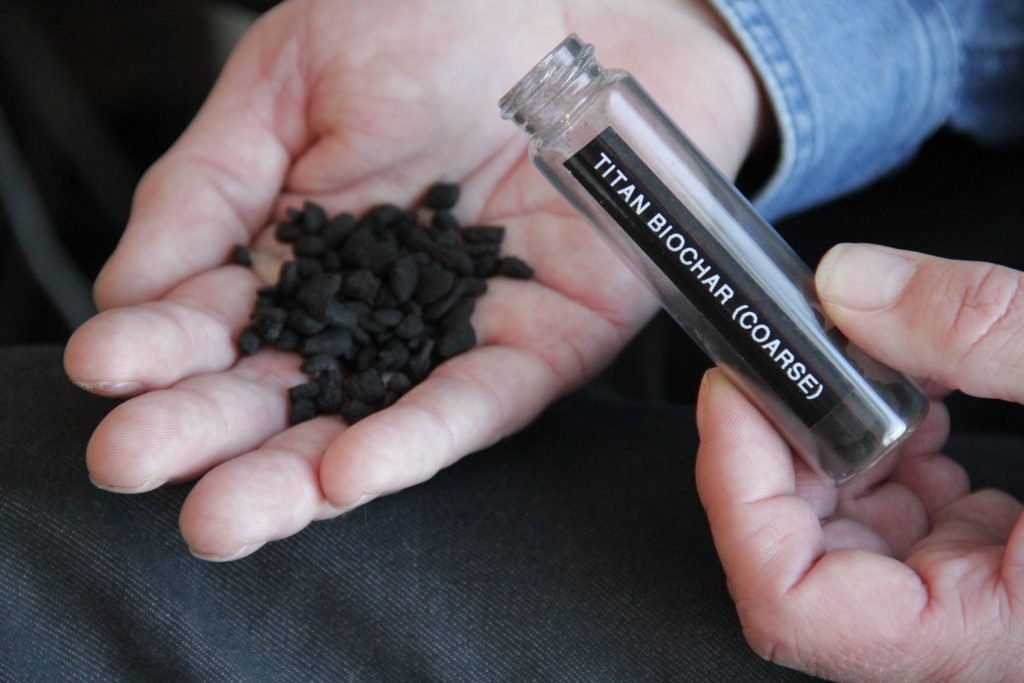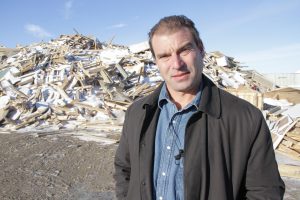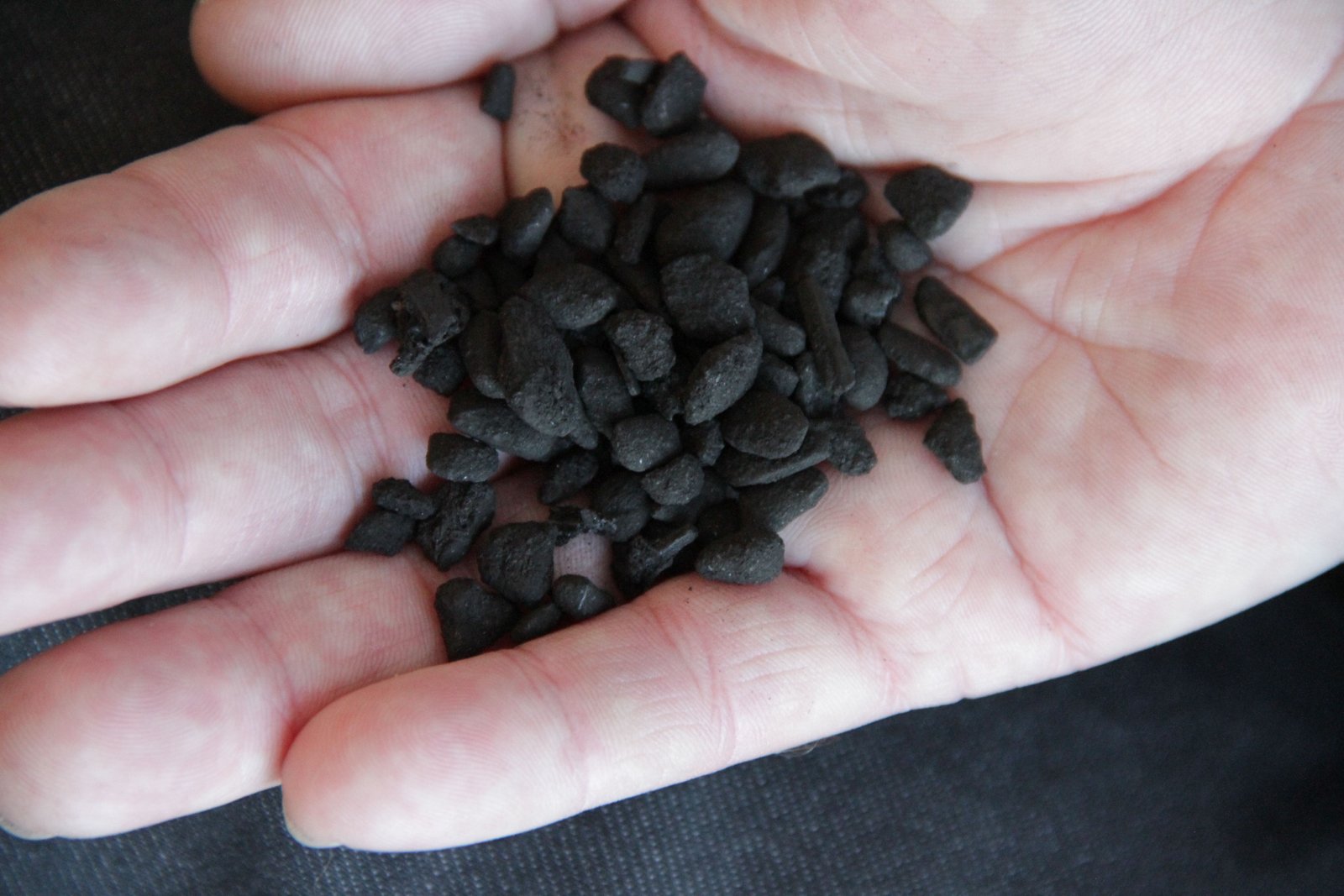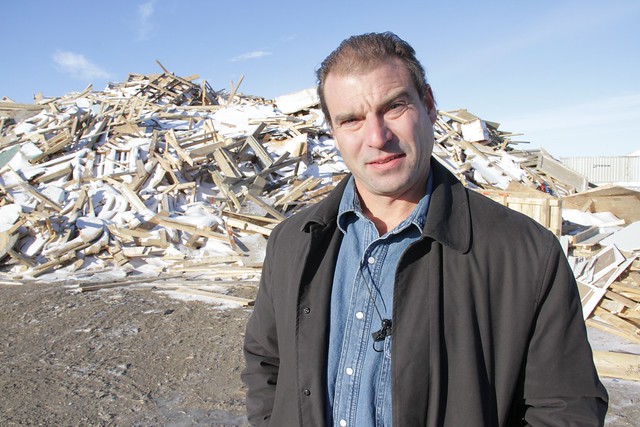By David Dodge and Duncan Kinney

James Bakos with a pile of biochar feed stock behind. Take some waste wood, heat it up to 600 degrees C with no oxygen and you get biochar, bio-oil and syngas. Photo David Dodge, Green Energy Futures
In the movie Interstellar, Matthew McConaughey’s character has a line that’s stuck with me: “We used to look up at the sky and wonder at our place in the stars. Now we just look down and worry about our place in the dirt.”
Soil is the thin crust of organic matter that supports all life on this planet. And if we treat it right it might just be solution to one of our greatest problems – climate change. There is more carbon in the soil than in the atmosphere and all of plant and animal life combined. By returning carbon to the soil on a massive scale we could have a solution to climate change under our feet.
Biochar
That’s where a small industrial plant in Craik, Saskatchewan comes in. Titan Clean Energy Projects has their processing facility in this unlikely place and it’s here where they make biochar.
Biochar is an extremely inert form of carbon made by heating up wood waste and organic material to 600 degrees Celsius in an enclosed space without the presence of oxygen in a process called pyrolysis. By returning this biochar to the soil on a large scale we could have a legitimate climate solution.
“We know that Canada is not meeting its carbon reduction targets. And this is one opportunity to provide a very big bang for the buck to reduce carbon emissions,” says Jamie Bakos, the CEO of Titan.

James Bakos with a pile of biochar feed stock behind. Take some waste wood, heat it up to 600 degrees C with no oxygen and you get biochar, bio-oil and syngas. Photo David Dodge, Green Energy Futures
But despite the fact that the world’s cultivated soils have lost 50 to 70 per cent of their carbon stock and that anthropogenic climate change threatens irreversible and dangerous impacts, there is still no meaningful price on carbon or a long-term strategy to reduce the amount of carbon in the atmosphere.
Without that in place Titan is focusing on other markets for its product. Look at biochar under a microscope and you can see the myriad pores and twists and folds. If you were to take one gram and it spread it out it would cover an area larger than a tennis court. And all that surface area gives good bacteria a place to call home.
“We’re just starting to see the payoff of some of our product development with the biochar in remediation, reclamation, water treatment, and possibly even animal nutrition,” says Bakos.
It’s hard work developing a market for a new product from scratch but Titan is making a go of it. They have retail products for sale — things like biochar for gardeners, fire logs and bulk absorbents.
But the biggest seller for them right now is in soil and water remediation.
“We have a product that helps break down hydrocarbons, helps plants deal with alkalinity and salt. Our next biggest use is for water purification and water treatment and that includes both drinking water and waste water. So, we’re using the biochar along with plants in a hydrosoil mixture to basically clean up waste water from the mining industry,” says Bakos.
Syngas and waste management
The pyrolysis process also produces syngas, a mixture of carbon monoxide, hydrogen and a bit of carbon dioxide. Titan burns this fuel to provide process heat to dry the biomass and the finished biochar, but it could also be used to generate clean electricity as well.
“We see definite applications for electricity production but as a small company with limited resources we chose not to tackle that one yet,” says Bakos.
By adjusting the temperature of the pyrolysis process you can produce either more biochar or more syngas.

The pores are four millionths of an inch in size making great homes for all sorts of bacteria. Photo Maurice Tuchelt, Titan Carbon Smart Technologies
For now Bakos is focused on scaling up and growing the biochar business. He especially likes it as a waste management solution. They can process 10,000 tons of materials a year, diverting it from local landfills. And they’re growing that side of the business at 35 per cent per year.
Although Bakos is necessarily preoccupied with developing markets for biochar, It turns out biochar isn’t as new a product as you might think. There is archeological evidence of people using biochar to enhance the fertility of their soils in the Amazon and Mayan jungles thousands of years ago. And those soils are still here today, fertile as ever. Bakos even named their retail brand of biochar for gardening Mayan Gold because of that historical legacy.
I must confess at first blush the idea of taking wood and organic materials and turning them into a relative of charcoal seemed like a crazy idea. But rejuvenating soils, sequestering carbon, dealing with waste, cleaning up oil spills and purifying water seem like pretty good results to me.
And while we’re not currently sequestering carbon in our soils on a massive scale, it’s comforting to know that companies like Titan are out there. If we ever do decide to get serious about climate change I’m happier knowing that we have real live entrepreneurs like James Bakos out there rather than Matthew McConaughey playing an astronaut.
EDITOR’s note – We have received quite a few offline responses to this story. There are some well armed skeptics of using biochar to store carbon on a large scale and the research is scant, so time and more research will tell if we can use this strategy to help climate change at scale. Thus far Titan has been mostly successful selling biochar for applications such as cleaning up oil spills and contaminants and water purification.

